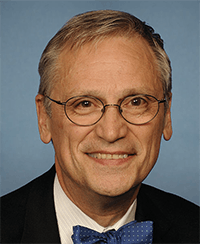

U.S. Rep. Earl Blumenauer (D-OR) is getting a jump on 2019 cannabis legislation by introducing H.R. 420, a bill that would remove cannabis from the federal list of controlled substances and roll its regulation into the Bureau of Alcohol, Tobacco, Firearms and Explosives.
The agency’s name would be changed to the Bureau of Alcohol, Tobacco, Marijuana, Firearms and Explosives.
“While the bill number may be a bit tongue-in-cheek, the issue is very serious," Blumenauer said in a public statement first reported by Willamette Week. "Our federal marijuana laws are outdated, out of touch and have negatively impacted countless lives. Congress cannot continue to be out of touch with a movement that a growing majority of Americans support. It's time to end this senseless prohibition."
Such legislation would open the door to an expansive cannabis market in the U.S., one that allows interstate commerce (like alcohol) and broad investments from the consumer packaged goods industry. Companies like Constellation Brands and Altria have already lined up partnerships (through multi-billion-dollar international investments) with an eye toward U.S. legalization.
H.R. 420’s introduction follows an invigorating year of cannabis legislation and policy shifts in 2018. In December, the U.S. Congress formally legalized hemp cultivation (as part of the 2018 Farm Bill).
To help H.R. 420 along, Blumenauer also announced the latest iteration of the Cannabis Caucus, which will see new faces helming the conversation about reform in D.C. this year.
The caucus’s leadership now includes: U.S. Reps. Barbara Lee (D-CA), Dave Joyce (R-OH) and Don Young (R-AK, At-Large). Joyce’s name is currently attached to the appropriations rider that protects medical marijuana businesses from U.S. Department of Justice prosecution, an amendment to which Blumenauer has in the past lent his name. (That appropriations bill is caught up amid President Trump’s political rhetoric over U.S.-Mexico border wall funding, and is currently in limbo, thanks to a federal government shutdown, leaving open the question of whether cannabis businesses are protected at all right now.)
Once things return to a relative sense of normalcy in Washington, the Cannabis Caucus will provide a space for congressional representatives to discuss and debate policy reform in 2019 and 2020.
“The Cannabis Caucus was the first of its kind to create a forum for elected officials to collaborate on ways to address our outdated federal marijuana laws,” Blumenauer said in a public statement. “Congress is clearly out of step with the American people on cannabis when national support for federal marijuana legalization is at an all-time high and we saw several states move toward legalization last November.”


























